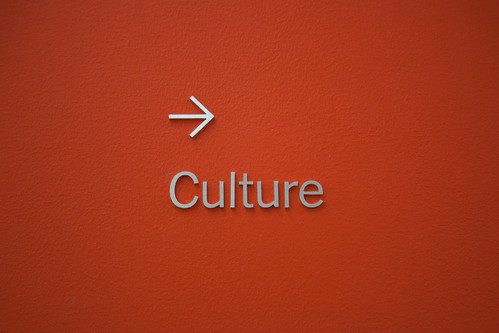I recently learned that last year a columnist claimed that, “You should only be allowed to enjoy the culture of your own race.”* Even if that was meant to be a joke, I thought I’d put the proverbial stake in the ground here, with something I’ve said verbally and on the Book of Faces (where everyone, including me, spouts off about everything): Cultural appropriation is the highest form of societal flattery.
That is to say, so far as cultural “appropriation” is a real phenomenon, we appropriate what we appreciate.
If your culture is being appropriated — if elements of your culture are being borrowed and copied and used by others — it is only because people find value in them. No one appropriates cultural elements that have no appeal.

This way to the culture…. (Image: “Culture,” by Scott Beale, on Flickr under Creative Commons.)
Life is too short to spend very much time eating foods we dislike or wearing clothes that don’t suit us or participating in activities we loathe. We feast on foods we love, no matter what the people looked like who originated them. We wear clothing that helps us feel comfortable and look good (so far as that’s possible, for some of us), no matter what language the people spoke who first wove the cloth or designed the patterns. We take part in games and rituals and enjoy music and drama that we find uplifting, that speak to us, that give us pleasure in company or alone, regardless of what patch of earth was home to the people who first made up those pastimes or told those stories.
I hope you take pride in your culture, and defend it fiercely from misuse or misappropriation. Certainly some cultural copying is intended to criticize or mock, but that’s the exception, not the norm. (And in a society of free people who value free speech, even that is a valid form of expression.)
But it remains that imitation, as it is said, is the highest form of flattery. In personal terms, we emulate people we admire. We say we want to be like them, and sometimes we go so far as to pattern our lives after theirs, although some of them may not appreciate the attention they get. So it is with cultural appropriation.
If elements of your culture are being appropriated, then, it’s because they are valuable — and valued.
___
*From a HuffPo piece that I’m not sure was meant to be serious or absurdist. (Whatever it was, it needed to be edited before it was posted.)








Great comments, gents, thanks!
G
Cultural appropriation can be a problem, if the culture being appropriated represents a group that is oppressed by mainstream society. As an easy example, many Black musicians were overlooked by the music industry in the early- and mid- 20th century while their unique music style was adopted by white artists who became wealthy.
Such clear cut examples of inappropriate cultural appropriation are harder to find today, so we end up with the absurdity of complaining about western appropriation of sushi and quinoa.
Just think, without cultural appropriation, there’d be no Taco Tuesday!
Seriously, though, cultural appropriation, we’d grow stagnate. Safe in our uniformity of focused and narrowed existence, but for how long? How long before, from our “sameness” barriers, we see “them” as being different. Different as in “wrong”.
No, thanks! I’ll keep Taco Tuesday and make it my very own. Even if it happens to be the day after I made German Potato Salad.